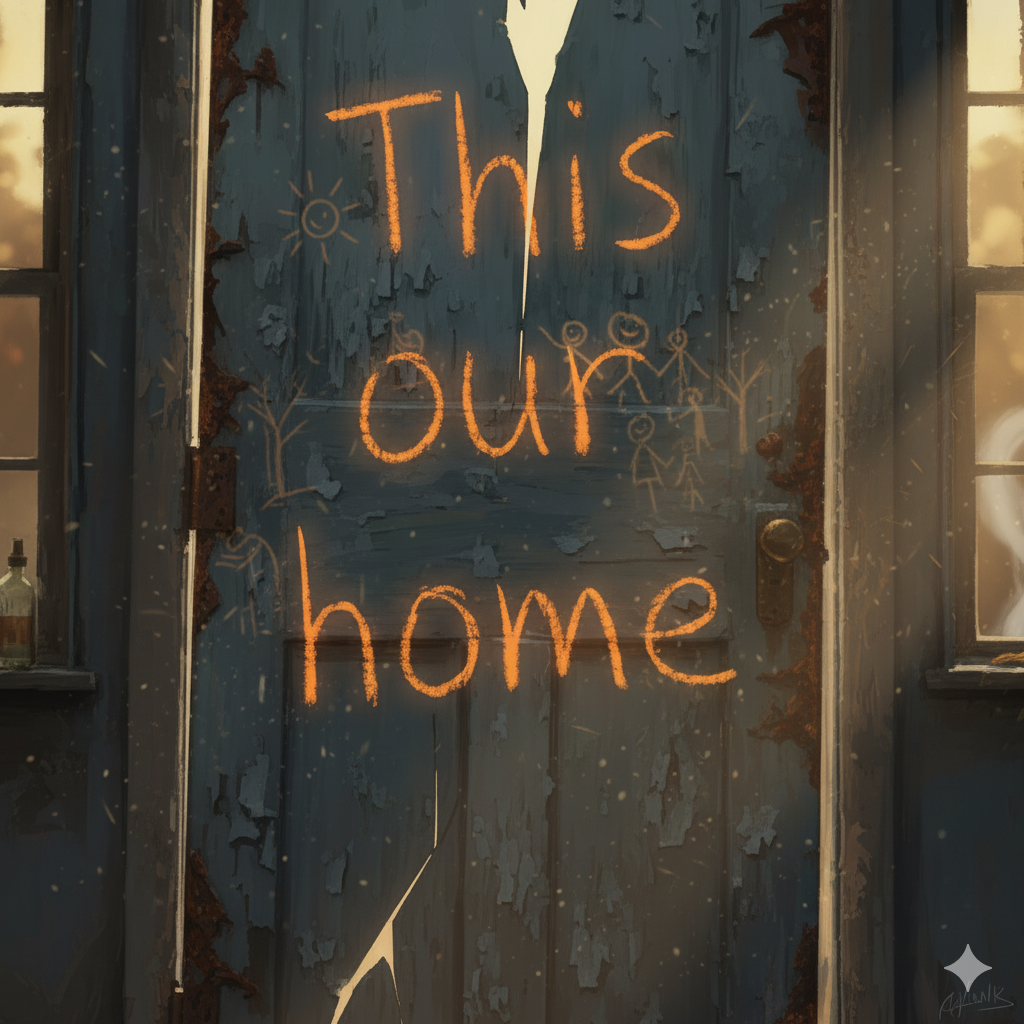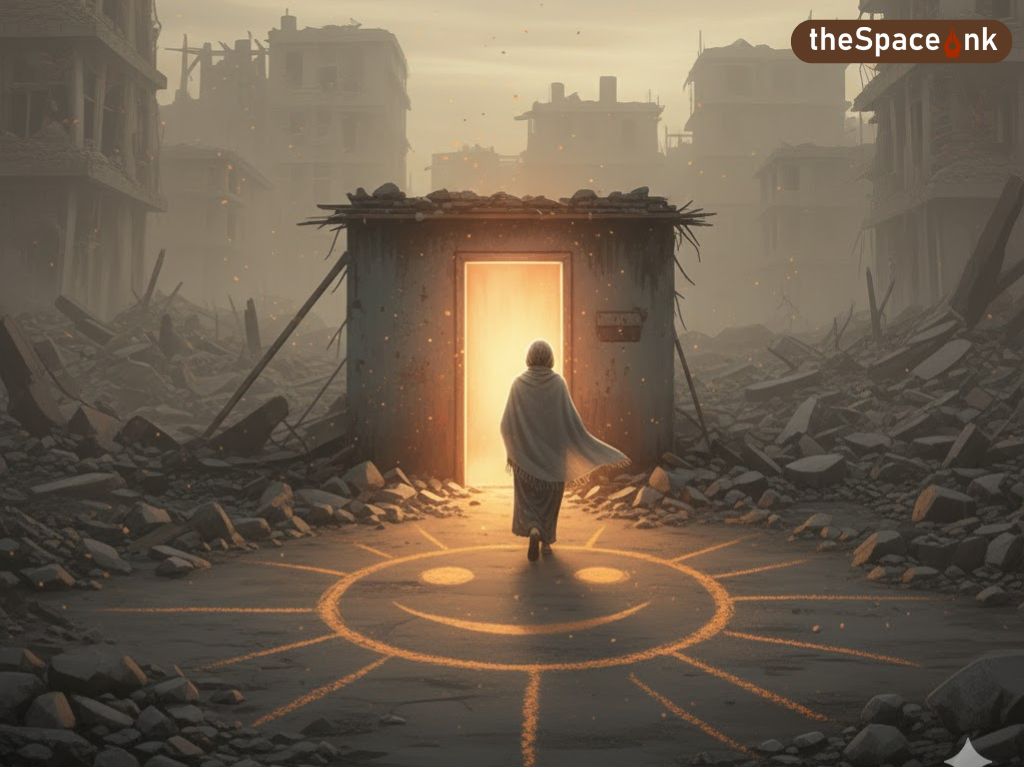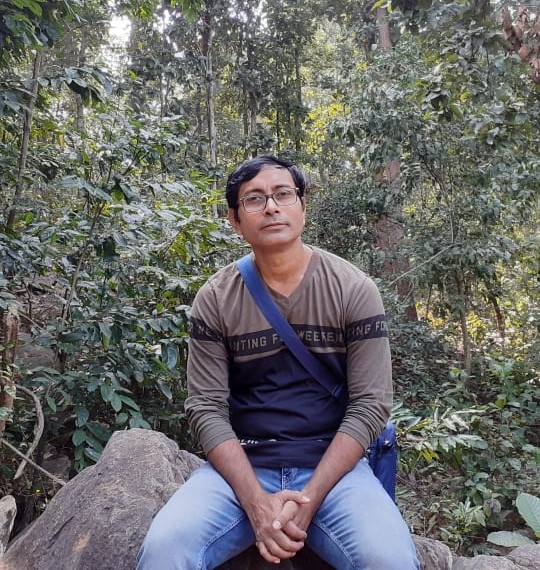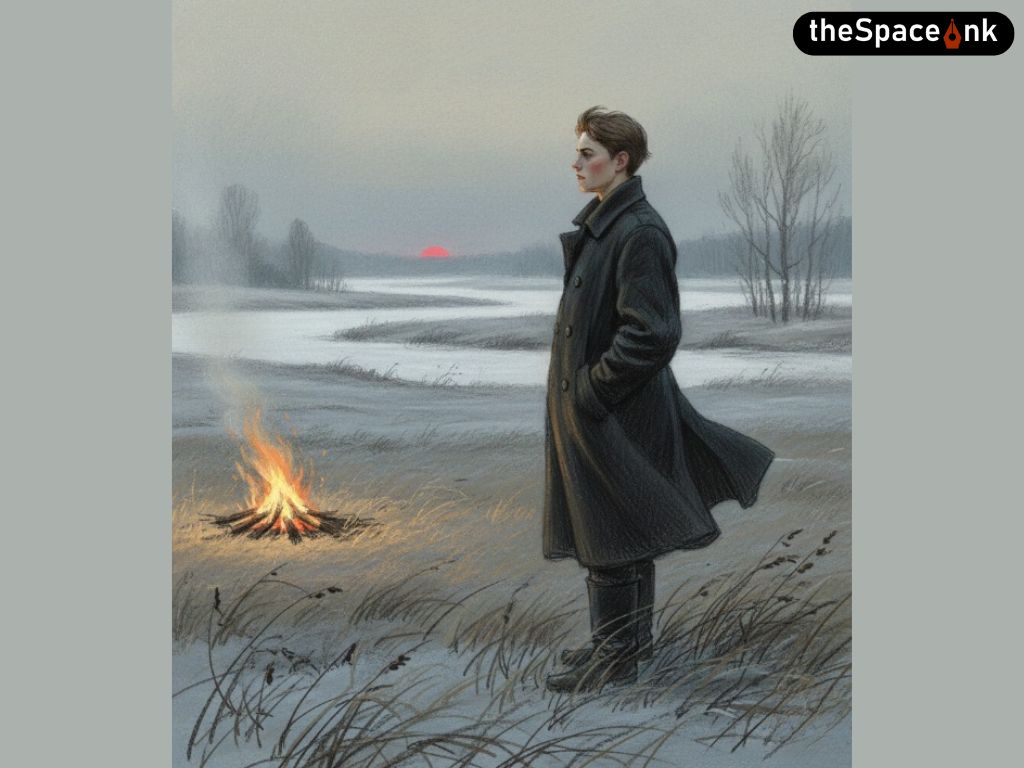(Home)
The words tremble on the kitchen door, drawn in orange crayon — crooked, bright, insistent. The paint has blistered, the hinges moan, but the letters endure. Each gust of wind makes the door sway gently, as if the house itself were breathing, remembering.
Major Malik notices it first. (Home)
He’s been walking through the wreckage since morning, marking each ruin with a red tag: unsafe, condemned, to be cleared. The entire street lies lined by hollowed, roofless ghosts of what used to be people’s homes; gutted by the last air strike. Smoke still hangs low over the ruins, mixing with the sour tang of wet concrete.
But this house makes him stop.
The orange writing stands out against the ash and grey, a child’s stubborn sunrise.
Also Read: Bikas—Story of a Nepali boy in Japan
He calls out to the woman standing at the edge of the rubble. She’s wrapped in a grey shawl despite the heat, her hands folded tightly around a small tin box. She steps carefully over the debris when he gestures her forward.
“Is this your house?” he asks.
She looks up at what remains — the broken walls, the gaping hole where a window once opened to a garden. Then her eyes fall on the words.
Her breath catches. “Yes,” she says softly. “My daughter wrote that.” (Home)

Her voice trembles just once, then steadies into something measured. “She’d just learned to write. Said she wanted to tell the world that this was ours. Our home.”
Inside, the air is heavy, smelling faintly of ash and something familiar — onions, maybe, or soap. A doll lies face-down beside the stove, her fabric skin stained grey. The photograph on the floor curls in on itself, edges crisped by heat: a man in uniform, a woman with wind-tossed hair, and a little girl holding a crayon like a magic wand.
“She always forgot the ‘is’,” she murmurs after a long silence. “Her teacher said she’d learn soon. But she liked it this way.
Malik bends to pick up the photo, dusting it gently. “Your husband?”
The woman nods. “Fire department. That morning he went to help with the rescue at the school. He never came back.” (Home)

There is no pain in her voice, only resignation. Malik sets the photograph carefully on what remains of the counter. The walls are streaked with smoke, but in one corner he can still make out faint drawings — stick figures, a sun, something that might have been a tree.
He clears his throat. “We’ll have this structure examined. Some parts might still be stable.”
But she doesn’t answer. Her eyes remain fixed on the door, on the orange scrawl that defies the ruin. (Home)
“She always forgot the ‘is’,” she murmurs after a long silence. “Her teacher said she’d learn soon. But she liked it this way. Said it sounded happier — like the house itself was speaking.”
Outside, a breeze rises, carrying dust and the faint hum of distant sirens. The door creaks again, swinging open and back, open and back — slow, deliberate, like a nod.
For a moment, neither of them moves. (Home)

Malik watches her reach out, fingers trembling slightly as they trace the bright letters. A flake of crayon dust comes off beneath her touch, but the colour holds — bold and impossible, the colour of marigolds that might still grow in memory.
“She used this same crayon to draw suns,” the woman says. “All over the walls. She said the house needed light inside it.”
The woman keeps tracing the letters, slow and reverent. “She used to sit right here, by the stove,” she says. “She’d wait for the rice to boil and draw on the door. Said the smell of food made the colours stronger.”
The wind shifts again, stirring a low groan from the half-broken rafters. Somewhere nearby, a windowpane gives way, shattering quietly. Malik glances up at the sound, then back at the woman.
There’s something steady in her now — a kind of overcast stillness that is heavier than grief.
He opens his mouth, then closes it again. There is nothing to offer here. Words are too small. (Home)
The woman keeps tracing the letters, slow and reverent. “She used to sit right here, by the stove,” she says. “She’d wait for the rice to boil and draw on the door. Said the smell of food made the colours stronger.”
The crayon lines catch the light as the afternoon sun breaks briefly through the smoke. For an instant, the whole doorway seems to glow.

Malik steps back, watching the play of light and dust. “It’s beautiful,” he says quietly.
She nods, though her eyes are distant. “It was. It still is.”
A moment passes — just wind and silence, the soft rattle of tin sheets.
Then she turns to go. The tin box in her hands rattles faintly; he guesses what it holds but doesn’t ask. At the threshold, she stops, looks once more at the door.
Her voice is barely above a whisper. “She said if anyone ever came here, they’d know this was home.” (Home)
Also Read: Lets Reclaim the World
The door moves again, a gentle swing in the shifting air, and for a heartbeat Malik could swear it nods — once, like acknowledgment.
The woman smiles faintly. “Yes,” she says, almost to the wind. “This was home.”
She walks away slowly, her figure dissolving into the light and dust.
Malik stands alone beside the ruined house. The orange letters burn against the grey, bright and defiant. He feels the urge to touch them, but doesn’t. Some things shouldn’t be disturbed — not even by care.
The wind quietens. The house settles. And in the stillness that follows, the words remain — a child’s handwriting, unshaken by fire or time. (Home)
This our home.
Photos generated by AI
A wanderer in words and wilderness, Koushik writes and translates to see the world — and himself — with mindful clarity.







